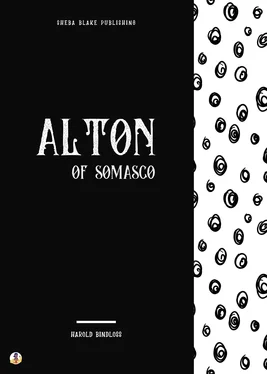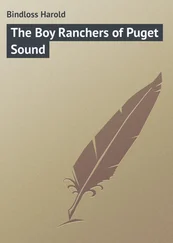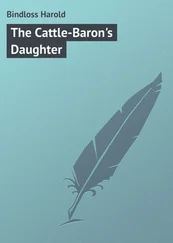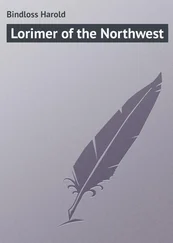He turned on his heel, and Hallam, who was a man of some importance in the cities, gasped with astonishment and indignation.
“What is that fellow?” he said.
The man laughed, and answered him in the bushman’s slowest drawl. “You don’t know much, or you wouldn’t ask,” said he. “He’s Alton of Somasco, but if he lives long enough he will be one of the biggest men in this country.”
Hallam said nothing, but there was a curious look in his face which puzzled the rancher. It suggested that he had heard of Alton, and something more.
Meanwhile Alton entered the store, where the man who kept it pointed to a litter of packages strewn about the floor and sundry bags upon the counter.
“That’s Townshead’s lot, and those are Thomson’s things,” he said, and turned aside to listen to a rancher who came in smiling.
Alton took up a big cotton bag marked Townshead, tossed it aloft and caught it, and then shook his head dubiously. “That’s rather too light for ten pounds. You want to try her on the scales again,” he said.
The storekeeper, who was also a magistrate, grinned good-humouredly. “It’s good enough for the money, anyway,” said he. “But what’s the matter with the Tyee dollars, Harry, that you wouldn’t do Hallam’s packing?”
Alton glanced at him gravely. “I think not,” said he. “Put another pound or two into her, and I’ll pay you on your invoice for the last lot you sent me. Otherwise I’m going to whittle down that bill considerably. You see Townshead is too shaky to come down, and he can’t live on nothing.”
“And the Lord knows when he’ll pay you,” said the storekeeper. “It’s a good twelve months since he sent a dollar to me.”
Alton laughed a little. “I can wait,” he said. “Fill that bag up again. Get hold of the truck, Charley.”
Charles Seaforth, who was apparently younger, and certainly a trifle more fastidious about his attire than his comrade, shouldered a flour bag, and twenty minutes later he and Alton tramped out of the settlement with three loaded beasts splashing and floundering in front of them. It was almost dark now, though a line of snow still glimmered white and cold high up beyond the trees until the trail plunged into the blackness of the forest. Then the lights of the settlement were blotted out behind them, the hum of voices ceased, and they were alone in the primeval silence of the bush. The thud and splash of tired hoofs only served to emphasize it, the thin jingle of steel or creak of pack-rope was swallowed up and lost, for the great dim forest seemed to mock at anything man could do to disturb its pristine serenity. It had shrouded all that valley, where no biting gale ever blew, from the beginning, majestic in its solitary grandeur and eternally green. Pine and hemlock, balsam and cedar, had followed in due succession others that had grown to the fulness of their stature only in centuries, and their healing essence, which brings sound sleep to man’s jaded body and tranquillity to his mind, had doubtless risen like incense when all was made very good.
Now Alton loved the wilderness, partly because he had been born in it, and because he had a large share of the spirit of his race. He had also seen the cities, and they did not greatly please him, though he had watched their inhabitants curiously and been taught a good deal about them by what he read in books, which to the wonder of his associates he would spend hardly-earned dollars upon. It was more curious that he understood all he read, and sometimes more than the writer apparently did, for Alton was not only the son of a clever man, but had seen Nature in her primitive nakedness and the human passions that usually lie beneath the surface, for man reverts a little and the veneer of his civilization wears through in the silent bush.
Thus he plodded on contentedly on his twelve-mile march, with the snow and the mire beneath it reaching now and then to his knee, until his companion stopped beside a little bark shanty and lighted a lantern.
“Thomson’s dumping-place already,” he said, pulling a burst cotton bag out of the sack of sundries upon the Cayuse pony’s back. “Some of it has got out, and Jimmy was always particular about the weight of his sugar. Well, the rest of it must be in the bottom somewhere, and if you’ll hold the sack up I’ll shake it into my hat.”
Alton’s hat was capacious, and he had worn it during the two years which had elapsed since his last visit to Vancouver, but it did not seem to occur to him that it was in any way an unusual receptacle for sugar. His companion, however, laughed a little as he stirred the sticky mass round with his wet fingers.
“There is no use giving him our tobacco and matches in,” said he. “Here are the letters Mrs. Neilson gave me at the post-office, too.”
Alton took the letters, and his face grew a trifle grim under the flickering light of the lantern as he thrust them crumpled into his pocket. “From England, and they will keep,” he said. “There’s nobody I’m anxious to hear from in that country. Now we’ll go on again, Charley.”
The Cayuse, however, objected, and there was a struggle before Alton convinced it that resistance would be useless, while presently the trail grew steeper and the roar of water came out of the darkness before them.
“This,” said Alton gravely, “is a great country, but it’s mighty unfinished yet, and it kind of hurts me to see all that power wasted.”
“Wasted?” said Seaforth, smiling. “Don’t the salmon swim in it, and the bear and deer come down to drink?”
“Oh, yes,” said Alton. “And sometimes the Siwash wash themselves in it too, but that’s not the question. This earth wasn’t made for the bear and deer, and they’ve thousands of poor folks they can’t find a use for back there in the old country. Isn’t that so, Charley?”
Seaforth, who was a young Englishman of good upbringing, laughed. “I have no reason for doubting it,” said he. “In any case, none of my worthy relations had any use for me. Still, I don’t see the connection exactly.”
“No?” said Alton. “Well, it’s simple. We have the gold and silver, and the coal and iron, too, while it don’t strike one that these forests were put here just to look pretty.”
“The metals you allude to take some trouble in getting out,” said Seaforth dryly.
Alton nodded. “Of course,” he said. “That’s what man got his brains for, and the one difference between a white man and a Siwash is that he’s always striking for something better.”
Seaforth laughed. “You are trying to get at something, as usual,” said he.
“Yes,” said Alton gravely. “I generally am. Well, I can see what we don’t want of these forests sailing sawn up to China, and this river sprinkled with sawmills and wood-pulp factories. Then I can hear the big dynamoes humming, and the thump of the mine stamps run with the current the men who put them down will get for nothing. What we’re wasting round Somasco is going to feed ten thousand people by and by.”
“It’s a big idea,” said Seaforth reflectively. “Still, I don’t know that if it were ever put through the place would look any prettier—and the question is, who’s going to set the whole thing running?”
“God knows,” said Alton gravely. “But somebody will, and if I live long enough I’ll make a shot at it. Oh, yes, it’s very pretty as it is, but the greatest thing in this world is man, and it was made as it is for him to master.”
“You have curious notions for a Canadian bush rancher,” said Seaforth. “You are, however, really an Englishman, aren’t you?”
“No,” said Alton grimly. “My father used to be, but he was too much of my way of thinking and they fired him out of the country. It’s a thing I don’t like to talk of, Charley, and just now I’m a low-down packer hauling in a pile of truck I’ll never get paid for. Steady, come up. There’s nothing going to hurt you, Julius Caesar.”
Читать дальше












